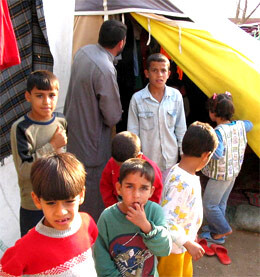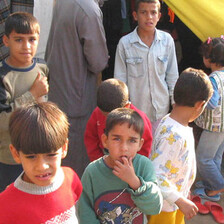The Electronic Intifada 15 April 2007

Palestinian families in Iraq suffer discrimination and displacement (IRIN)
“Our situation is getting worse from day to day, yet no one sees what we’re going through and helps us get through this ordeal,” Qussai Mohammed Saleh, a 32-year-old Palestinian refugee, told IRIN in a phone interview from al-Waleed border camp.
Saleh is a truck driver who was born, and later married, in Iraq. He now lives with his wife and two children in a tent at the al-Waleed border camp, where 758 Palestinian refugees are undertaking the sit-in protest. Another 826 Palestinian refugees are scattered in three other makeshift camps.
Saleh said the refugees were tired of short-term solutions to their predicament. “We’re refusing all assistance. The solution to our problem does not lie in giving us assistance. We rejected two truckloads of aid two days ago, donated by an Italian aid agency,” Saleh said.
“It’s been raining cats and dogs for the past two days and the heavy rain has filled our tents with water. We demand that Arab and international leaders take an immediate decision about us. There’s only one goal for us and that’s to get out of Iraq as soon as possible without being hurt. We’ll continue with our sit-in until we achieve this goal.”
Palestinians face continual harassment
Saleh has been at al-Waleed camp since last December. He lived in Baghdad before that but said he has faced continual harassment from militants and US-Iraqi forces since soon after the fall of the deceased former President Saddam Hussein.
Palestinians, many of whom fled to Iraq from the newly created state of Israel in 1948, were treated well under Saddam’s government, causing some Iraqis to resent them.
But immediately after the fall the former regime, these refugees were seen by Shia militiamen and government security forces as collaborators of Sunni insurgents.
Saleh chose to flee the country, but is stranded at the border in miserable conditions because he has been unable to gain entrance to any neighbouring country.
Dalil al-Qusous, the Palestinian charge d’affaires in Baghdad, appealed to the Iraqi and Arab governments as well as to international aid agencies to give the stranded Palestinian refugees the provisions they need.
“They are still living under harsh conditions. They badly need essential humanitarian aid such as food, water, medicines and tents,” al-Qusous said.
“I call upon Iraqi and Arab countries and international humanitarian agencies to help them, especially now after they have started their open sit-in,” he added.
Last month, a Palestinian refugee was killed and dozens were arrested in a raid by Iraqi security forces in Baladiat, a predominantly Palestinian neighbourhood in eastern Baghdad.
Iraqi Interior Ministry officials defended the raid, saying it was targeting a gang dealing in stolen cars and saying security forces faced resistance when they went to arrest suspects.
The killing and the raid prompted the United Nations Refugees Agency (UNHCR) to reiterate its calls to the Iraqi government to protect Palestinian refugees in Iraq. The agency also appealed to Arab governments to allow the Palestinians into their territories.
UNHCR said at least 186 Palestinians have been murdered in Baghdad between April 2004 and January 2007, while about 15,000 Palestinians remain in Iraq, fewer than half the number who had lived there previously.
This item comes to you via IRIN, a UN humanitarian news and information service, but may not necessarily reflect the views of the United Nations or its agencies. All IRIN material may be reposted or reprinted free-of-charge; refer to the copyright page for conditions of use. IRIN is a project of the UN Office for the Coordination of Humanitarian Affairs.
Related Links


